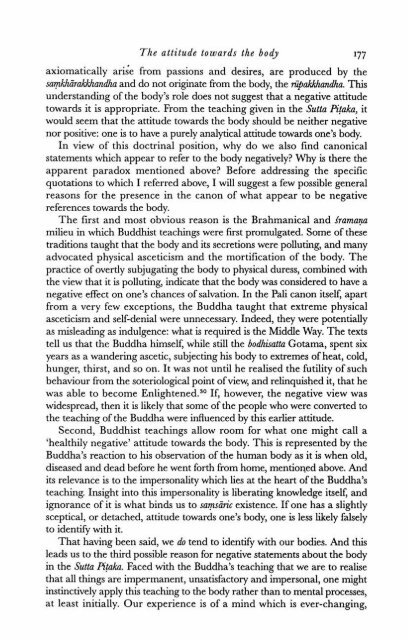Identity and Experience_Hamilton_1996
Identity and Experience_Hamilton_1996
Identity and Experience_Hamilton_1996
You also want an ePaper? Increase the reach of your titles
YUMPU automatically turns print PDFs into web optimized ePapers that Google loves.
The attitude towards the body<br />
I77<br />
axiomatically ariie from passions <strong>and</strong> desires, are produced by the<br />
saM5rahWz<strong>and</strong>ha <strong>and</strong> do not originate from the body, the nipakkh<strong>and</strong>ha. This<br />
underst<strong>and</strong>ing of the body's role does not suggest that a negative attitude<br />
towards it is appropriate. From the teaching given in the Sutta @aka, it<br />
would seem that the attitude towards the body should be neither negative<br />
nor positive: one is to have a purely analytical attitude towards one's body.<br />
In view of this doctrinal position, why do we also find canonical<br />
statements which appear to refer to the body negatively? Why is there the<br />
apparent paradox mentioned above? Before addressing the specific<br />
quotations to which I referred above, I will suggest a few possible general<br />
reasons for the presence in the canon of what appear to be negative<br />
references towards the body.<br />
The first <strong>and</strong> most obvious reason is the Brahmanical <strong>and</strong> Sramana<br />
milieu in which Buddhist teachings were first promulgated. Some of these<br />
traditions taught that the body <strong>and</strong> its secretions were polluting, <strong>and</strong> many<br />
advocated physical asceticism <strong>and</strong> the mortification of the body. The<br />
practice of overtly subjugating the body to physical duress, combined with<br />
the view that it is polluting, indicate that the body was considered to have a<br />
negative effect on one's chances of salvation. In the Pali canon itself, apart<br />
from a very few exceptions, the Buddha taught that extreme physical<br />
asceticism <strong>and</strong> self-denial were unnecessary. Indeed, they were potentially<br />
as misleading as indulgence: what is required is the Middle Way. The texts<br />
tell us that the Buddha himself, while still the bodhkatta Gotama, spent six<br />
years as a w<strong>and</strong>ering ascetic, subjecting his body to extremes of heat, cold,<br />
hunger, thirst, <strong>and</strong> so on. It was not until he realised the futility of such<br />
behaviour from the soteriological point of view, <strong>and</strong> relinquished it, that he<br />
was able to become Enlightened.30 If, however, the negative view was<br />
widespread, then it is likely that some of the people who were converted to<br />
the teaching of the Buddha were influenced by this earlier attitude.<br />
Second, Buddhist teachings allow room for what one might call a<br />
'healthily negative' attitude towards the body. This is represented by the<br />
Buddha's reaction to his observation of the human body as it is when old,<br />
diseased <strong>and</strong> dead before he went forth from home, mentioqed above. And<br />
its relevance is to the impersonality which lies at the heart of the Buddha's<br />
teaching. Insight into this impersonality is liberating knowledge itself, <strong>and</strong><br />
ignorance of it is what binds us to sa?nscTric existence. If one has a slightly<br />
sceptical, or detached, attitude towards one's body, one is less likely falsely<br />
to identify with it.<br />
That having been said, we do tend to identify with our bodies. And this<br />
leads us to the third possible reason for negative statements about the body<br />
in the Sutta R-taka. Faced with the Buddha's teaching that we are to realise<br />
that all things are impermanent, unsatisfactory <strong>and</strong> impersonal, one might<br />
instinctively apply this teaching to the body rather than to mental processes,<br />
at least initially. Our experience is of a mind which is ever-changing,


